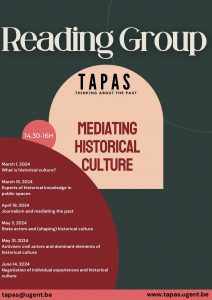TAPAS READING GROUP SERIES 2024
Over the next months, this new TAPAS reading group series dives into reflections on the mediators of historical culture. Over the past decades, interdisciplinary academic fields such as memory studies and theory of history have been focusing on questions related to how people deal with the past. The notion of “historical culture” brings together a multitude of different approaches, as it incorporates – but is not limited to – much used concepts like individual memory, collective memory, and historiography (Grever, 2017).
Since the turn of the century, important critiques of memory studies have urged scholars to pay attention to how our understanding of the past is mediated by various actors, infrastructures, and communication formats (Kansteiner, 2002; Klein, 2002; Wertsch, 2002). More recently, memory scholars are calling for a move towards an interscalar approach, addressing interactions between private and public ways of relating to the past on different levels in society, drawing scholarly interest to the “meso” level of remembering that occurs between individual (“micro”) and mass-mediated (“macro”) representations of the past (Keightley et al., 2019).
In this reading group series, we inquire into the role of mediators on these different scales. Who are the actors that influence historical culture? Who are the “gatekeepers” of memory? In what ways do these mediators attempt to shape collective representations of the past? Who is seen as an “expert” of the past, and how do other agents contest or claim the authority in the field of historical knowledge? How does a society deal with tensions that arise from contradictory representations of the past on different levels? And how do these questions relate to the notion of “authenticity” of historical experience and knowledge? As a point of departure, our first session discusses two classic texts to delineate the concept of “historical culture” and set the stage for the rest of our discussions. After this, we discuss a different group of mediators each week, including academic historians, journalists, state actors, activists, etc.
PRACTICAL INFO AND CONTACT
TAPAS reading groups are informal and we welcome all interested colleagues and students to join the discussion. We will share all literature beforehand and will organize all sessions both virtually as well as physically. Join us online via Google Meet or at the Malpertuis meeting room (Ghent, UFO, third floor).
PROGRAM
Friday March 1, 2024 | 14.30-16.00
What is historical culture?
- Grever, Maria and Robbert-Jan Adriaansen. “Historical Culture: A Concept Revisited.” In Palgrave handbook of research in historical culture and education, eds. Mario Carretero, Stefan Berger and Maria Grever, 73-84. London: Palgrave Macmillan, 2017.
- Grever, Maria. “Fear of Plurality: Historical Culture and Historiographical Canonization in Western Europe.” In Gendering historiography: beyond national canon, eds. A. Epple and A. Schaser, 45-62. Campus Verlag, 2009.
Friday March 29, 2024 | 14.30-16.00
Who acts as experts of historical knowledge in public spaces?
Friday April 19, 2024 | 14.30-16.00
How do journalists mediate the past?
- Edy, Jill A. “Journalistic uses of collective memory.” Journal of Communication, vol. 49, nr. 22 (1999): 71-85.
- Schudson, Michael. “Journalism as a vehicle of non-commemorative cultural memory.” In Journalism and memory, eds. Barbie Zelizer and Keren Tenenboim-Weinblatt, 85-96. Houndmills: Palgrave Macmillan, 2014.
- (Optional) Kitch, Carolyn. “Historical authority and the ‘potent journalistic reputation’: a longer view of legacy-making in American news media.” In Journalism and memory, eds. Barbie Zelizer and Keren Tenenboim-Weinblatt, 227-241. Houndmills: Palgrave Macmillan, 2014.
Friday May 3, 2024 | 14.30-16.00
How do state actors shape historical culture?
- Pocock, J.G.A. “The politics of history: the subaltern and the subversive.” The Journal of Political Philosophy vol. 6, nr. 3 (1998): 219-234.
- Bevernage, Berber and Nico Wouters. “State-sponsored history after 1945: an introduction.” In The Palgrave Handbook of State-Sponsored History after 1945, eds. Berber Bevernage and Nico Wouters, 1-27. London: Palgrave Macmillan, 2018.
- Optional — VanSledright, Bruce. “Narratives of nation-state, historical knowledge, and school history education.” Review of Research in Education 32, nr. 1 (2008): 109-146.
Friday May 31, 2024 | 14.30-16.00
How do civil actors contest or support dominant elements of historical culture?
- Yarimar Bonilla. The Past is made by walking: Labor Activism and Historical Production in Postcolonial Guadeloupe. Cultural Anthropology, Volume26, Issue3, 2011.
- Andrew Flinn, Archival Activism: Independent and Community-led Archives, Radical Public History and the Heritage Professions. InterActions: UCLA Journal of Education and Information Studies, 7(2), 2011.
Friday June 14, 2024 | 14.30-16.00
How do individuals negotiate their experiences to influence historical culture?
